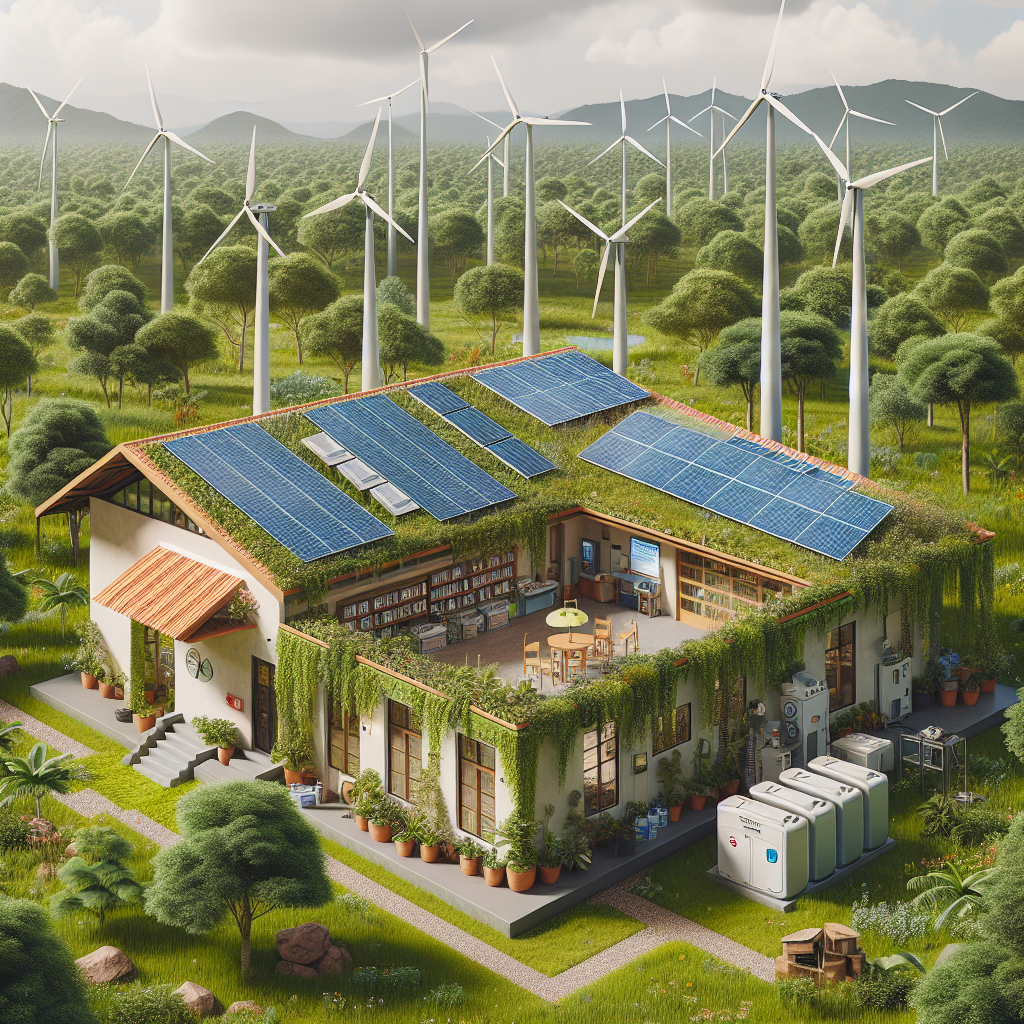In remote areas, healthcare facilities often face unique challenges in securing reliable and sustainable power supply. These facilities may be located far from major grid networks, making them vulnerable to power outages and disruptions. Recognizing these challenges, JC Davis Power Rentals delves into the emerging trends and advancements in power supply for remote healthcare settings.

Decentralized Power Generation
Decentralized power generation refers to the production of electricity from a variety of small, dispersed sources, rather than a small number of large, centralized power plants. This approach offers several advantages, including:
- Increased energy independence: By utilizing local resources and reducing reliance on imported energy sources, communities become more self-sufficient and resilient.
- Reduced environmental impact: Decentralized power generation often involves the use of renewable energy technologies, which produce electricity without emitting greenhouse gases or other harmful pollutants.
- Improved grid reliability: By dispersing power generation across multiple locations, the grid becomes more resistant to disruptions caused by natural disasters or cyberattacks.
Decentralized Power Generation Technologies:
- Solar PV arrays: These systems convert sunlight directly into electricity using photovoltaic cells. Solar PV is a clean, renewable, and widely available energy source that can be deployed in both urban and rural areas.
- Wind turbines: Wind turbines capture the kinetic energy of the wind and convert it into electricity. Wind energy is a variable resource, but it can be a significant contributor to decentralized power generation in windy regions.
- Micro-hydro systems: Micro-hydro systems use the flow of water to generate electricity. These systems are typically installed on small streams or rivers and can provide a reliable source of power in areas with abundant water resources.
Applications of Decentralized Power Generation
Decentralized power generation is particularly well-suited for remote healthcare facilities, which often face challenges in accessing reliable and affordable grid-based power. By adopting decentralized power generation systems, these facilities can:
- Ensure a reliable power supply: Decentralized power generation systems provide a backup power source in the event of grid outages, ensuring that critical medical equipment and services can continue to operate.
- Reduce operating costs: By generating their own electricity, healthcare facilities can reduce their reliance on expensive imported fuel and improve their overall financial sustainability.
- Promote environmental sustainability: Decentralized power generation systems help healthcare facilities reduce their carbon footprint and contribute to a healthier environment for patients and staff.
Integration of Energy Storage Solutions:
The intermittent nature of renewable energy sources, such as solar and wind, poses a significant challenge to the reliable operation of remote healthcare facilities. To address this challenge, these facilities are increasingly turning to energy storage solutions, particularly battery energy storage systems (BESS), to ensure continuous power supply.
Benefits of Energy Storage Integration:
- Optimized Energy Usage: BESS allows remote healthcare facilities to store excess energy produced during peak generation periods, such as midday for solar systems, and release it during times of low generation or grid outages. This enables more efficient utilization of renewable energy resources, reducing reliance on fossil fuels and lowering operating costs.
- Improved Grid Stability: By integrating energy storage, remote healthcare facilities can contribute to grid stability. During periods of high demand, BESS can release stored energy to support the grid, preventing blackouts and brownouts. Conversely, during periods of low demand, BESS can absorb excess energy from the grid, helping to balance supply and demand.
- Uninterrupted Power Supply: For remote healthcare facilities, uninterrupted power supply is critical for ensuring the well-being of patients and the continuity of essential medical services. BESS provides a reliable backup power source, ensuring that critical operations, such as medical equipment and life-support systems, continue to function even during grid outages or power disruptions.
Implementation Considerations:
- Battery Technology: Various battery technologies are available for energy storage, each with its own advantages and disadvantages. Common options include lithium-ion batteries, lead-acid batteries, and flow batteries. The choice of battery technology depends on factors such as cost, lifespan, energy density, and environmental impact.
- System Design: The design of an energy storage system for a remote healthcare facility requires careful consideration of several factors, including the size of the renewable energy system, the expected energy demand, and the desired level of backup power. Proper system design ensures optimal performance and reliability.
- Integration with Renewable Energy Systems: Integrating energy storage with renewable energy systems requires careful planning and coordination. The energy storage system should be seamlessly integrated with the renewable energy system to ensure efficient energy flow and maximize the utilization of renewable energy resources.
- Maintenance and Monitoring: Regular maintenance and monitoring of the energy storage system are essential to ensure its long-term performance and reliability. This includes routine inspections, battery testing, and system diagnostics to identify and address any potential issues promptly.
Advancements in Generator Technologies:
Technological advancements have revolutionized generator technologies, leading to more efficient and environmentally conscious solutions for remote healthcare facilities. These advancements include:
- Emission Control Systems: Modern generators are equipped with advanced emission control systems, such as catalytic converters and particulate filters, which significantly reduce harmful emissions, minimizing the environmental impact and complying with stringent regulations.
- Smart Technologies Integration: The integration of smart technologies, such as remote monitoring and control systems, enhances generator operation and efficiency. These systems enable real-time monitoring of generator performance, predictive maintenance scheduling, and optimized fuel management, resulting in reduced downtime and improved cost-effectiveness.
Microgrids: Ensuring Resiliency and Reliability:
Microgrids have emerged as a comprehensive solution for remote healthcare facilities seeking reliable and resilient power supply. These self-contained energy systems offer several advantages:
- Energy Independence: Microgrids allow healthcare facilities to operate independently from the main grid, providing energy security and resilience. This is particularly crucial in remote areas prone to grid outages or natural disasters, ensuring uninterrupted patient care and critical services.
- Multiple Power Sources: Microgrids combine various power generation sources, such as solar panels, wind turbines, and generators, to optimize energy production and reduce reliance on a single fuel source. This diversification enhances reliability and flexibility, allowing healthcare facilities to adapt to changing energy needs and market conditions.
- Smart Control Systems: Microgrids utilize smart control systems that intelligently manage energy flow, optimize power generation, and seamlessly switch between different power sources. These systems ensure efficient and reliable operation, minimizing energy waste and maximizing the utilization of renewable energy resources.
Adoption of Hybrid Power Systems:
Hybrid power systems are gaining popularity in remote healthcare facilities due to their numerous advantages. These systems combine multiple power generation sources, such as solar PV, wind, and traditional fossil fuel-based generators, to optimize energy usage and reduce operating costs.
Benefits of Hybrid Power Systems:
- Reduced Operating Costs: Hybrid systems minimize reliance on expensive fossil fuels, leading to lower operating costs.
- Improved Energy Efficiency: By integrating renewable energy sources, hybrid systems maximize energy utilization and minimize energy waste.
- Enhanced Reliability: Combining different power sources ensures a reliable and uninterrupted power supply, even during grid outages or adverse weather conditions.
- Reduced Environmental Impact: Hybrid systems reduce greenhouse gas emissions and contribute to a cleaner environment.
Digitalization and Remote Monitoring:
Digitalization and remote monitoring technologies are transforming the operation and maintenance of power supply systems in remote healthcare facilities. These technologies enhance operational efficiency, reliability, and proactive maintenance.
Benefits of Digitalization and Remote Monitoring:
- Real-Time Monitoring: Advanced monitoring systems provide real-time data on energy usage, generator performance, and fuel levels, enabling operators to make informed decisions.
- Remote Troubleshooting: Remote monitoring capabilities allow operators to identify and address issues remotely, minimizing downtime and optimizing maintenance schedules.
- Predictive Maintenance: Digitalization enables predictive maintenance, allowing operators to anticipate and prevent potential problems, reducing the risk of unexpected breakdowns.
- Improved Efficiency: Digitalization and remote monitoring optimize energy usage, leading to improved efficiency and reduced operating costs.
Collaboration and Partnership:
The successful operation of remote healthcare facilities heavily relies on the collaborative efforts of healthcare providers, energy companies, and power rental specialists. This partnership plays a vital role in addressing the unique power supply challenges faced by these facilities, ensuring reliable and cost-effective power solutions.
- Healthcare Providers:
Healthcare providers possess a deep understanding of the specific power requirements of their facilities, including the critical equipment and systems that must be continuously powered. They can provide valuable insights into the facility’s power needs, usage patterns, and any special considerations that need to be taken into account.
- Energy Companies:
Energy companies bring expertise in power generation, distribution, and grid management. They can assess the existing power infrastructure in the remote area, identify potential challenges, and develop tailored solutions to meet the facility’s power demands. They can also provide ongoing support and maintenance services to ensure the reliable operation of the power supply system.
- Power Rental Specialists:
Power rental specialists offer specialized equipment and services to provide temporary or backup power solutions. They can quickly deploy generators, solar panels, or other power sources to meet the immediate needs of the healthcare facility. They can also provide ongoing monitoring and maintenance services to ensure the equipment is operating efficiently and safely.
By working together, these stakeholders can develop comprehensive power supply solutions that are tailored to the specific requirements of each remote healthcare facility. This collaborative approach ensures that the facility has access to reliable, cost-effective, and sustainable power, enabling it to provide quality healthcare services to the community.
Conclusion:
Remote healthcare facilities face distinct challenges in securing reliable and sustainable power supply. JC Davis Power Rentals emphasizes the importance of adopting innovative power supply trends, including decentralized power generation, energy storage integration, advanced generator technologies, microgrids, hybrid power systems, digitalization, and collaborative partnerships. By embracing these trends, healthcare facilities can overcome power supply challenges, ensuring uninterrupted patient care, enhancing operational efficiency, and reducing environmental impact.
Contact JC Davis Power Rentals today to discuss your power supply needs for remote healthcare facilities. Our experienced team is dedicated to providing customized power solutions, ensuring reliable and efficient energy for your critical operations.





